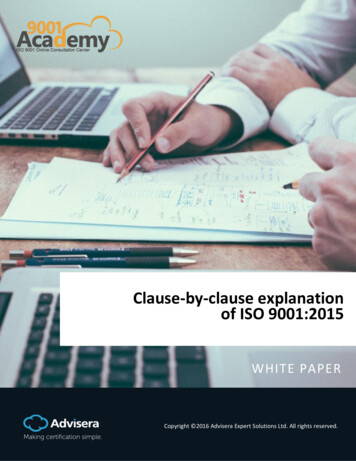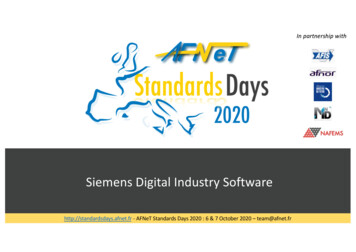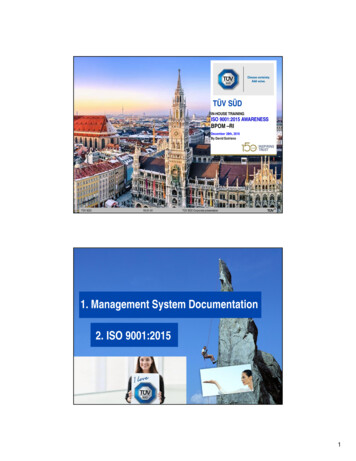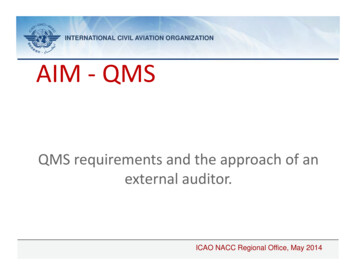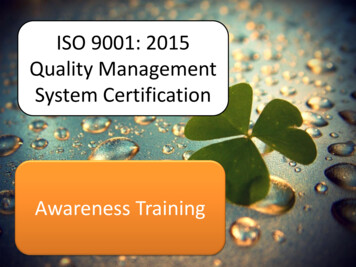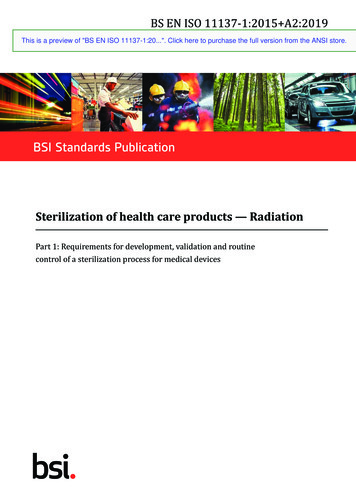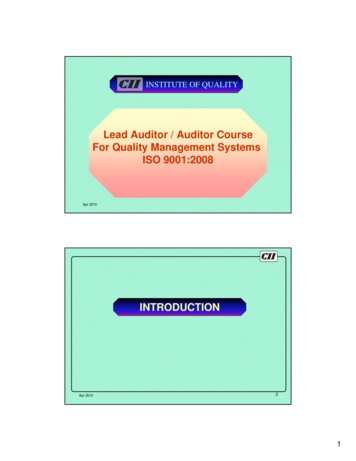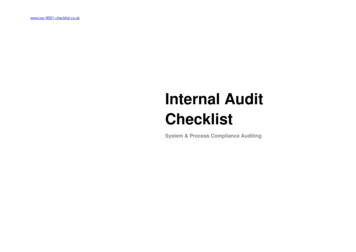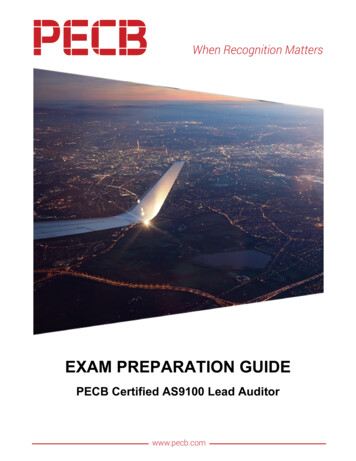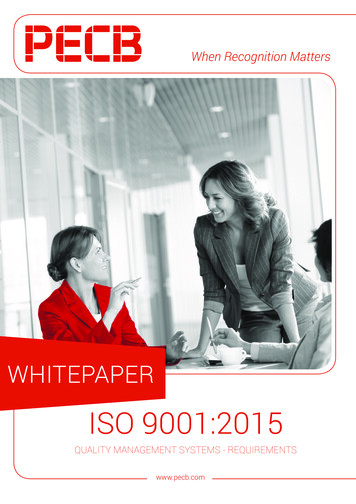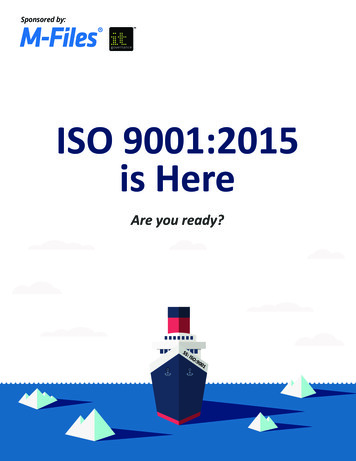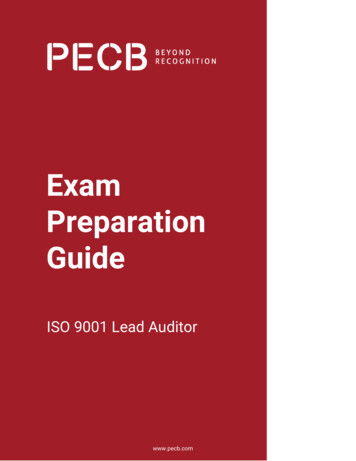
Transcription
ExamPreparationGuideISO 9001 Lead Auditorwww.pecb.comwww.pecb.com
GENERALThe objective of the “PECB Certified ISO 9001 Lead Auditor” exam is to ensure that thecandidate has the necessary competence to: perform a quality management system(QMS) audit in compliance with the ISO 9001 standard requirements; manage an auditteam by applying widely recognized audit principles, procedure, and techniques; and,lastly, plan and carry out internal and external audits as per the guidelines of ISO 19011and in compliance with the ISO/IEC 17021-1 certification process.The ISO 9001 Lead Auditor exam is intended for: Auditors seeking to perform and lead quality management system (QMS) auditsManagers or consultants seeking to master the quality management system auditprocessIndividuals responsible to maintain conformity with the QMS requirements in anorganizationTechnical experts seeking to prepare for a quality management system auditExpert advisors in quality managementThe exam covers the following competency domains: Domain 1: Fundamental principles and concepts of a quality management system(QMS)Domain 2: Quality management system (QMS)Domain 3: Fundamental audit concepts and principlesDomain 4: Preparing an ISO 9001 auditDomain 5: Conducting an ISO 9001 auditDomain 6: Closing an ISO 9001 auditDomain 7: Managing an ISO 9001 audit programPECB Exam Preparation GuideISO 9001 Lead Auditor V2.5 2020 PECB 2
The content of the exam is divided as follows:Domain 1: Fundamental principles and concepts of a qualitymanagement system (QMS)Main objective: Ensure that the candidate understands, is able to interpret ISO9001 principles and conceptsCompetencies1.2.3.4.Ability to understand and explain the ISOoperations and the development of the ISO9001 standardAbility to identify, analyze and evaluate theISO 9001 requirementsAbility to understand the QualityManagement tools and techniquesAbility to explain and illustrate the mainconcepts in Quality Management SystemKnowledge statements1.2.3.4.5.6.PECB Exam Preparation GuideISO 9001 Lead Auditor V2.5Knowledge of the application of the sevenfundamental ISO management principles inQMS.Knowledge of the main standards in QualityManagementKnowledge of the different sources of QualityManagement requirements for an organization,including: laws, regulations, international andindustry standards, contracts, marketpractices, internal policiesKnowledge of Quality Circles, Total QualityManagement, Six Sigma, Lean, Kaizen, Just-inTime, etc.Knowledge of the main Quality Managementconcepts and terminology as described in ISO9001Knowledge of the concepts of processapproach and risk-based thinking in QualityManagement 2020 PECB 3
Domain 2: Quality management systems (QMS) and ISO 9001requirementsMain objective: Ensure that the candidate understands, is able to interpret, andidentify the requirements for a quality management system based on ISO 9001Knowledge statementsCompetencies1.2.3.Ability to understand and explain thecomponents of a Quality ManagementSystem based on ISO 9001 and its principalprocesses.Ability to interpret and analyze therequirements of ISO 9001Ability to understand, explain and illustratethe main steps to establish, implement,operate, monitor, review, maintain andimprove an organization’s QMS1.2.3.4.5.6.PECB Exam Preparation GuideISO 9001 Lead Auditor V2.5Knowledge of the concepts, principles andterminology related to management systemsand the "Plan-Do-Check-Act" (PDCA) modelKnowledge of the principal characteristics ofan integrated management systemKnowledge of the main advantages of acertification for an organizationKnowledge of the ISO 9001 requirementspresented in clauses 4 to 10Knowledge of the main steps to establish theQMS, policies, objectives, processes andprocedures relevant to managing risk andimproving Quality Management to deliverresults in accordance with an organization’soverall policies and objectives (awarenesslevel)Knowledge of the concept of continualimprovement and its application to a QMS 2020 PECB 4
Domain 3: Fundamental audit concepts and principlesMain objective: Ensure that the candidate can understand, is able to interpret, andapply the main concepts and principles related to a QMS auditCompetencies1.2.3.4.5.6.7.8.Ability to understand, explain and illustratethe application of the audit principles in thecontext of an ISO 9001 auditAbility to identify and judge situations thatwould discredit the professionalism of theauditor and the PECB Code of EthicsAbility to identify and evaluate ethicalproblems taking into account theobligations related to the audit client,auditee, and law enforcement andregulatory authoritiesAbility to explain, illustrate and apply theaudit evidence approach in the context ofan ISO 9001 auditAbility to explain and compare the typesand characteristics of evidenceAbility to determine and justify what type ofevidence and how much evidence will berequired in the context of a specific QMSaudit missionAbility to determine and evaluate the levelof materiality and apply the risk-basedapproach throughout the different phasesof an ISO 9001 auditAbility to judge the appropriate level ofreasonable assurance needed for aspecific ISO 9001 audit missionPECB Exam Preparation GuideISO 9001 Lead Auditor V2.5Knowledge statements1.Knowledge of the main audit concepts andterminology as described in ISO 190112. Knowledge of the differences between firstparty, second party and third party audits3. Knowledge of the following audit principles:integrity, fair presentation, due professionalcare, professional judgment, professionalskepticism, confidentiality, independence andrisk-based approach4. Knowledge of the professional responsibility ofan auditor and the PECB Code of Ethics.5. Knowledge of evidence-based approach in anaudit6. Knowledge of the different types of evidences:physical, mathematical, confirmative,technical, analytical, documentary and verbal7. Knowledge of the quality of audit evidences(competent, appropriate, reliable andsufficient) and the factors that will influencethem8. Knowledge of the risk-based approach in anaudit and the different types of risks related toaudit activities9. Knowledge of the concept of materiality and itsapplication in an audit10. Knowledge of the concept of reasonableassurance and its applicable in an audit 2020 PECB 5
Domain 4: Preparing an ISO 9001 auditMain objective: Ensure that the candidate is able to prepare a QMS auditCompetencies1.2.3.4.5.6.Ability to understand and explain the stepsand activities to prepare a QMS audit takinginto consideration the specific context andconditions of the audit missionAbility to understand and explain the rolesand responsibilities of the audit teamleader, audit team members and technicalexpertsAbility to determine, evaluate and confirmthe audit objectives, the audit criteria andthe audit scope for a specific ISO 9001audit missionAbility to conduct a feasibility study of anaudit in the context of a specific ISO 9001audit missionAbility to explain, illustrate and define thecharacteristics of the audit terms ofengagement and apply the best practicesto establish a first contact with an auditeein the context of a specific ISO 9001 auditmissionAbility to develop audit working papers andelaborate appropriate audit test plans inthe context of a specific ISO 9001 auditmissionPECB Exam Preparation GuideISO 9001 Lead Auditor V2.5Knowledge statements1.Knowledge of the main responsibilities of theaudit team leader and audit team members2. Knowledge of the roles and responsibilities oftechnical experts in an audit3. Knowledge of the definition of audit objectives,audit scope and audit criteria4. Knowledge of the difference between the QMSscope and the audit scope5. Knowledge of the elements to review duringthe feasibility study of an audit6. Knowledge of the cultural aspects to considerin an audit7. Knowledge of the characteristics of auditterms of engagement and the best practices toestablish a first contact with an auditee8. Knowledge of the preparation of an audit plan9. Knowledge of the preparation anddevelopment of audit working papers10. Knowledge of the advantages anddisadvantages of using audit checklists11. Knowledge of the best practices for thecreation of audit test plans 2020 PECB 6
Domain 5: Conducting an ISO 9001 auditMain objective: Ensure that the candidate can efficiently conduct a QMS auditCompetencies1.2.3.4.5.Ability to organize and conduct the openingmeeting in the context of a specific ISO9001 audit missionAbility to conduct a stage 1 audit in thecontext of a specific ISO 9001 auditmission and taking into account thedocumentation review conditions andcriteriaAbility to conduct a stage 2 audit in thecontext of a specific ISO 9001 auditmission by applying the best practices ofcommunication to collect the appropriateevidence and taking into account the rolesand responsibilities of all people involvedAbility to explain, illustrate and applystatistical techniques and main auditsampling methods.Ability to objectively gather appropriateevidence from the available informationduring an audit and evaluate it objectivelyKnowledge statements1.Knowledge of the objectives and the content ofthe opening meeting of an audit2. Knowledge of the difference between stage 1audit and stage 2 audit3. Knowledge of stage 1 audit requirements,steps and activities4. Knowledge of the documentation reviewcriteria5. Knowledge of the documentation requirementsstated in ISO 90016. Knowledge of stage 2 audit requirements,steps and activities7. Knowledge of the best practices ofcommunication during an audit8. Knowledge of the roles and responsibilities ofguides and observers during an audit9. Knowledge of the conflict resolutiontechniques10. Knowledge of evidence collection procedures:observation, documentation review, interviews,analysis and technical verification11. Knowledge of evidence analysis procedures:corroboration and evaluation12. Knowledge of the main concepts, principlesand statistical techniques used in an audit13. Knowledge of the main audit samplingmethods and their characteristicsPECB Exam Preparation GuideISO 9001 Lead Auditor V2.5 2020 PECB 7
Domain 6: Closing an ISO 9001 auditMain objective: Ensure that the candidate is able to conclude a QMS audit andconduct audit follow-up activitiesCompetencies1.2.3.4.5.6.7.8.Ability to explain and apply theevaluation process of evidences to draftaudit findings and prepare auditconclusionsAbility to understand, explain andillustrate the different levels ofconformity and the concept of thebenefit of the doubtAbility to report appropriate auditobservations in order to help anorganization improve a QMS withrespect to audit rules and principlesAbility to complete audit workingdocuments and conduct a quality reviewof an ISO 9001 auditAbility to draft audit conclusions andpresent these to the management of theaudited organizationAbility to organize and conduct an auditclosing meetingAbility to write an ISO 9001 audit reportand justify a certificationrecommendationAbility to conduct the activities followingan initial audit including the evaluationof action plans, follow-up audits,surveillancePECB Exam Preparation GuideISO 9001 Lead Auditor V2.5Knowledge statements1.Knowledge of the evaluation process ofevidences to draft audit findings and prepareaudit conclusions2. Knowledge of the differences and thecharacteristics between the concepts ofconformity, minor nonconformity, majornonconformity, anomaly and observation.3. Knowledge of the guidelines and best practices towrite nonconformity reports4. Knowledge of the guidelines and best practices todraft and report audit observations5. Knowledge of the principle of the benefit of thedoubt and its application in the context of anaudit.6. Knowledge of the guidelines and best practices tocomplete audit working documents and perform aquality review of an audit7. Knowledge of the guidelines and best practices topresent audit findings and conclusions to themanagement of an audited organization8. Knowledge of the possible recommendations thatan auditor can issue in the context of acertification audit and the certification decisionprocess9. Knowledge of the guidelines and best practices toevaluate action plans10. Knowledge of follow-up audits, surveillance auditsand recertification audit requirements, steps andactivities11. Knowledge of the conditions for modification,extension, suspension or withdrawal of acertification for an organization 2020 PECB 8
Domain 7: Managing an ISO 9001 audit programMain objective: Ensure that the understands how to establish and manage a QMSaudit programCompetencies1.2.3.4.5.6.Ability to understand and explain theestablishment of an audit program and theapplication of the PDCA modelAbility to understand and explain theimplementation of an ISO 9001 auditprogram (first party, second party and thirdparty)Ability to understand and explain theresponsibilities to protect the integrity,availability and confidentiality of auditrecords.Ability to understand the requirementsrelated to the components of themanagement system of an audit programas quality management, recordmanagement, and complaint managementAbility to understand the evaluation of theefficiency of the audit program bymonitoring the performance of eachauditor, each team and the entirecertification bodyAbility to demonstrate the application ofthe personal attributes and behaviorsassociated with professional auditorsPECB Exam Preparation GuideISO 9001 Lead Auditor V2.5Knowledge statements1.2.3.4.5.6.7.8.9.Knowledge of the application of the PDCAmodel in the management of an audit programKnowledge of the requirements, guidelines andbest practices regarding audit resources,procedures and policiesKnowledge of the types of tools used byprofessional auditorsKnowledge of the requirements, guidelines andbest practices regarding the management ofaudit recordsKnowledge of the application of the concept ofcontinual improvement to the management ofan audit programKnowledge of the particularities to implementand manage a first, second or third party auditprogramKnowledge of the management of combinedaudit activitiesKnowledge of the concept of competency andits application to auditorsKnowledge of the personal attributes andbehavior of a professional auditor 2020 PECB 9
Based on the above mentioned domains and their relevance, 12 questions areincluded in the exam, as summarized in the following table:Level of understanding(Cognitive/Taxonomy) requiredPoints perquestionCompetency domainsFundamentalprinciples andconcepts of aqualitymanagementsystem (QMS)Questions thatmeasurecomprehension,application andanalysis5XQuestionsthat measuresynthesis andevaluationNumber ofquestions percompetencydomain% of testdevoted toeachcompetencydomainNumber ofpoints percompetencydomain% of alitymanagementsystems (QMS)5X10X5XFundamentalaudit conceptsand principles5X18.3356.67Preparing an ISO9001 .6710X5X5X5X10XManaging anISO 9001 auditprogram5XTotal points75Conducting anISO 9001 auditClosing an ISO9001 Audit6650.0050.00Number of questions per levelof understanding% of the exam devoted to eachlevel of understanding(cognitive/taxonomy)The exam passing score is 70%.After successfully passing the exam, candidates will be able to apply for the “PECBCertified ISO 9001 Lead Auditor” credential depending on their level of experience.PECB Exam Preparation GuideISO 9001 Lead Auditor V2.5 2020 PECB 10
Taking the ExamGeneral Information on the ExamCandidates are required to arrive/be present at least 30 minutes before the exam starts.Candidates who arrive late will not be given additional time to compensate for the latearrival and may not be allowed to sit for the exam.Candidates are required to bring a valid identity card (a national ID card, driver’s license,or passport) and show it to the invigilator.If requested on the day of the exam (paper-based exams), additional time can beprovided to candidates taking the exam in a non-native language, as follows: 10 additional minutes for Foundation exams20 additional minutes for Manager exams30 additional minutes for Lead examsPECB Exam Format and Type1. Paper-based: Exams are provided on paper, where candidates are not allowed to useanything but the exam paper and a pen. The use of electronic devices, such as laptops,tablets, or phones, is not allowed. The exam session is supervised by a PECB approvedInvigilator at the location where the Reseller has organized the training course.2. Online: Exams are provided electronically via the PECB Exams application. The use ofelectronic devices, such as tablets and cell phones, is not allowed. The exam session issupervised remotely by a PECB Invigilator via the PECB Exams application and anexternal/integrated camera.For more detailed information about the online format, please refer to the PECB OnlineExam Guide.PECB exams are available in two types:1. Essay-type question exam2. Multiple-choice question examPECB Exam Preparation GuideISO 9001 Lead Auditor V2.5 2020 PECB 11
This exam comprises essay-type questions. They are used to determine and evaluatewhether a candidate can clearly answer questions related to the defined competencydomains. Additionally, problem-solving techniques and arguments that are supportedwith reasoning and evidence will also be evaluated.The exam is open book and is not intended to measure memorizing or recallinginformation. It aims to evaluate candidates’ comprehension, analytical skills, andapplied knowledge. Therefore, candidates are required to provide logical and convincinganswers and explanations in order to demonstrate that they have understood thecontent and the main concepts of the competency domains.Since the exam is “open book,” candidates are authorized to use the following referencematerials: A hard copy of ISO 9001 standardTraining course materials(accessed through PECB Exams app and/or printed)Any personal notes made by the candidate during the training course(accessedthrough PECB Exams app and/or printed)A hard copy dictionaryAny attempts to copy, collude, or otherwise cheat during the exam session willautomatically lead to failure of the exam.PECB exams are available in English and other languages. For the availability of theexam in a particular language, please contact examination@pecb.com.Note: PECB will progressively transition to multiple-choice exams. They will also be openbook and comprise scenario-based questions that will allow PECB to evaluatecandidates’ knowledge, abilities, and skills to use information in new situations (apply),draw connections among ideas (analyze), and justify a stand or decision (evaluate). AllPECB multiple-choice exams have one question and three alternatives, of which only oneis correct.For specific information about exam types, languages available, and other details, visitthe List of PECB Exams.PECB Exam Preparation GuideISO 9001 Lead Auditor V2.5 2020 PECB 12
Receiving the Exam ResultsExam results will be communicated via email. The only possible results are pass andfail; no specific grade will be included. The time span for the communication starts from the exam date and lasts threeto eight weeks for essay type exams and two to four weeks for multiple-choicepaper-based exams For online multiple-choice exams, candidates receive their results instantlyCandidates who successfully complete the exam will be able to apply for one of thecredentials of the respective certification scheme.For candidates who fail the exam, a list of the domains where they have performedpoorly will be added to the email to help them prepare better for a retake.Candidates that disagree with the results may request for a re-evaluation by writing toresults@pecb.com within 30 working days of receiving the results. Re-evaluationrequests received after 30 days will not be processed. If candidates do not agree withthe results of the reevaluation, they have 30 working days from the date when theyreceived the reevaluated exam results to file a complaint through the PECB TicketingSystem. Complaints received after 30 days will not be processed.PECB Exam Preparation GuideISO 9001 Lead Auditor V2.5 2020 PECB 13
Exam Retake PolicyThere is no limit on the number of times that a candidate may retake an exam. However,there are certain limitations in terms of the allowed time frames between exam retakes. If a candidate does not pass the exam on the 1st attempt, they must wait 15 daysfrom the initial date of the exam for the next attempt (1st retake). Retake feesapply.Note: Candidates who have completed the training course but failed the exam areeligible to retake the exam once for free within a 12-month period from the initialdate of the exam. If a candidate does not pass the exam on the 2nd attempt, they must wait threemonths after the initial date of the exam for the next attempt (2nd retake).Retake fees apply.Note: For candidates that fail the exam in the 2nd retake, PECB recommendsthem to attend a training course in order to be better prepared for the exam. If a candidate does not pass the exam on the 3rd attempt, they must wait sixmonths after the initial date of the exam for the next attempt (3rd retake).Retake fees apply. After the 4th attempt, the waiting period for further retake exams is 12 monthsfrom the date of the last attempt. Retake fees apply.To arrange exam retakes (date, time, place, costs), candidates need to contact thePECB Reseller/Distributor who has initially organized the session.Reschedule the ExamFor any changes with regard to the exam date, time, location, or other details, pleasecontact examination@pecb.com.Closing a CaseIf a candidate does not apply for the certificate within three years, their case will beclosed. Candidates whose case has been closed due to the expiration of thecertification period have the right to request to reopen their case. However, PECB will nolonger be responsible for any changes in the conditions, standards, policies, candidatehandbook, or exam preparation guide that were applicable before the case was closed.A candidate requesting their case to reopen must do so in writing and pay the requiredfee.PECB Exam Preparation GuideISO 9001 Lead Auditor V2.5 2020 PECB 14
Exam SecurityA significant component of a successful and respected professional certificationcredential is maintaining the security and confidentiality of the exam. PECB relies uponthe ethical behavior of certificate holders and applicants to maintain the security andconfidentiality of PECB exams. Any disclosure of information about the content of PECBexams indicates violation of PECB’s Code of Ethics. PECB will take action againstindividuals who violate PECB Policies and the Code of Ethics. These actions includepermanently barring individuals from pursuing PECB credentials and revoking theawarded credentials. PECB will also pursue legal action against individuals ororganizations who infringe upon its copyrights, proprietary rights, and intellectualproperty.PECB Exam Preparation GuideISO 9001 Lead Auditor V2.5 2020 PECB 15
Sample Exam QuestionsQuestion 1: Evaluation of Corrective ActionsYou have received a corrective action plan for review. Please evaluate the effectiveness of the proposedcorrective actions. If you agree with these corrective actions, please explain why. If you do not agree,please explain why and propose an alternative more adequate corrective action.― Nonconformity: A nonconformity was observed because the Human Resources team was notaware of a procedure that requires them to record the education, training, and experience of allemployeesCorrective action: Inform (Timeframe: immediately) and train (Timeframe: within 6 months) the HumanResources team about this procedure and require that each member of the team follow itPossible answer:I agree with the proposed corrective action. This solves the problem of the lack of knowledge about theexistence of a procedure. As an auditor, a sampling will be performed during the surveillance audit to findout if the procedure is followed correctlyPECB Exam Preparation GuideISO 9001 Lead Auditor V2.5 2020 PECB 16
Question 2: Writing of a Test PlanWrite a test plan to validate conformity to the following clause by identifying the different applicable auditprocedures (observation, documented information review, interview, technical verification and analysis):Clause 7.5.3 Control of documented information:Possible answer:Clause 7.5.3 Control of documented information:Documented information required by the quality management system and by ISO 9001 shall becontrolled to ensure:a) It is available and suitable for use, where and when it is neededb) It is adequately protected (e.g. from loss of confidentiality, improper use or loss ofintegrity)ObservationObserve how employees ensure the protection of documented informationand whether those actions are consistent with the organization’s policiesand proceduresDocumentedinformationPolicy on documented information management and procedures oninformation lifecycle management: their identification, storage, backup,protection, accessibility and conservationInterviewMembers of management (to confirm the policies and the organization’sneeds related to documented information) and the personnel responsible forinformation management and archiving (to obtain the documentedinformation management details)TechnicalverificationValidate the electronic structure for classifying and storing documentedinformation, verify their protection mechanisms, and observe thecompilation of the automated journals reportAnalysisSelect documented information samples and verify if they respect thedocumentation structure and policy criteria on documented informationPECB Exam Preparation GuideISO 9001 Lead Auditor V2.5 2020 PECB 17
Address:Head Quarters6683 Jean Talon E,Suite 336 Montreal,H1S 0A5, QC,CANADATel./Fax.T: 1-844-426-7322F: 1-844-329-7322PECB Help CenterVisit our Help Center to browse Frequently Asked Questions (FAQ), view manuals for using PECB website andapplications, read documents related to PECB processes, or to contact us via Support Center’s online trackingsystem.Emails:Examination: examination@pecb.comCertification: certification@pecb.comCustomer Care: customer@pecb.comCopyright 2020 PECB. Reproduction or storage in any form for any purpose is not permitted withouta PECB prior written permission.www.pecb.comPECB Exam Preparation GuideISO 9001 Lead Auditor V2.5 2020 PECB 18
ISO 9001 Lead Auditor V2.5 Domain 2: Quality management systems (QMS) and ISO 9001 requirements Main objective: Ensure that the candidate understands, is able to interpret, and identify the requirements for a quality management system based on ISO 9001 Competencies 1. Ability to unde
